Yes, it’s a double post because I’d like to finish my 2022 posts by and large within 2022…
On which note, I’ve started thinking about my reading for next year and I’ve noticed I tend not to read many long novels. I think that’s partly just because they are a big commitment, but also because the thing with blogs is you want to be part of a conversation (even haltingly as I am these days). If you read just one book in a whole month then you can feel less a part of that conversation.
The thing is though, while I love a novella, there are some really good long books out there that totally justify their length. So I’m thinking 2023 may be when I try to read fewer books but tackle some that require sustained attention.
Anyway! October and November. Both good solid reading months and a couple of stand-out reads.
OCTOBER
I’ll Sell You a Dog, Juan Pablo Villalobos (translated by Rosalind Harvey)

This is my third Villalobos and he remains a favorite. Here it’s the tale of a retired taco seller who moves into an apartment building where the residents are all semi-compulsory members of a book club who quickly become obsessed with the idea he’s writing a novel. It’s a satire on art and literary criticism and very, very funny.
Content warning (I know, how millennial of me), there are several dogs killed over the course of the book which is normally a total deal-killer for me. It’s not dwelt on in terms of the details or frankly I’d have had to stop reading, but it is one of the running jokes and is I think among other things a bit of a commentary on the contrast between the brutality of life and the pretensions of art and literature lovers, but that may be just my own pretensions speaking.
That warning makes this maybe not your best choice as a first Villalobos. If though you already like him this is another star turn on his part.
Perfecting Sound Forever, Greg Milner
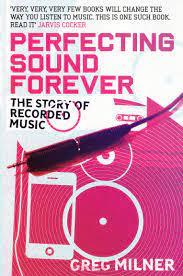
On paper this is a fascinating concept – a history of the technology of recorded sound and its impact on music. For me though this didn’t work. I encountered several fairly basic scientific howlers in the first chapter plus some quite repetitive and meandering language. I know very little about recording technology but I do know some basic physics and if a book gets the stuff I do know wrong it dents my confidence that I can trust the rest.
One example, bizarrely Milner thinks Neanderthals didn’t have art. Fine, it’s not a book about human evolution but he uses it as the basis for an admittedly short bit of speculation and he’s so profoundly wrong on that point I found myself wondering what research he’d done in other areas or if he’s just working on what he believes to be true and making assertions.
There’s no point really to an educational non-fiction book once you lose trust. Others have loved this though so if the concept appeals I’d suggest looking at some wider reviews. I bailed.
Central Station, Lavie Tidhar
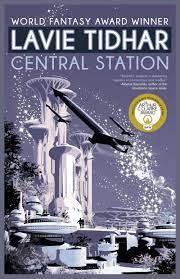
My October piece of science fiction and a very strong choice. This is a series of connected short stories set in the future space port of Tel Aviv. What makes it work so well is Tidhar’s focus is not on the spaceships and colonies and all that (much as I do sometimes love all that), but in the sense of life continuing on the ground much as it ever has.
A man returns from Mars to encounter his former love, both of them now much older but no wiser. A young woman falls in love with the semi-roboticised veteran of a forgotten war. A construction worker trades with transhuman intelligences in the hope of building a legacy to pass to his children and grandchildren. The trappings of society have changed, but people haven’t.
If you know your SF history there’s a lot of references buried in here which are fun to discover but they’re not necessary for the core of the book. Tidhar creates a future that is utterly persuasive not in its details, of course those won’t come true, but in its sense of a lived place with people making do as best they can just as they always did. It’s a tremendous achievement.
Don’t Go to Sleep in the Dark, Celia Fremlin
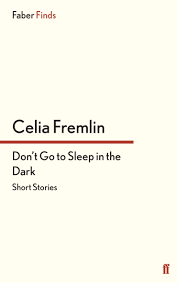
I adored Celia Fremlin’s The Hours Before Dawn. What I didn’t realize then was Fremlin also wrote a lot of short stories. They tend to be in the same vein as Dawn – claustrophobic psychological horror/suspense, with every now and then a story having a low key supernatural element. They’re not quite horror, but they certainly are horror-adjacent.
This is I think Fremlin’s first collection and it’s very good, particularly for a winter read. Radhika wrote up a slim Faber volume which comprises some of the best of this collection here and Guy has written up lots of Fremlin here. I’ll be reading more by her.
A Short History of Progress, Ronald Wright
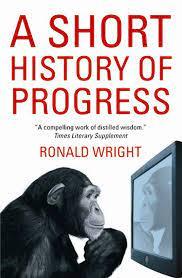
Typically I don’t read much non-fiction, but I felt like a change in October and read a few titles out of my normal range. This one is a series of essays on societal collapse which were turned into a book back in 2004. It examines how various civilisations have failed and tries to see if there are lessons we can draw from them to avoid the same fate.
It’s well written and extremely interesting. Wright does indeed draw some lessons, but I had the feeling he wasn’t that hopeful we’d learn them. A good and thought-provoking read but not one that gave me much hope for the future. We’re no smarter after all than those who’ve gone before us and our better insights and understanding of the world doesn’t seem to translate much into better behaviours.
Turned Out Nice Again, Richard Mabey
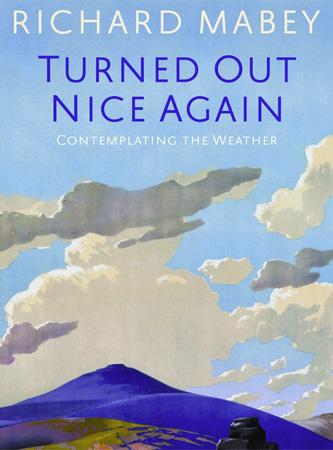
Richard Mabey is a well regarded English nature writer, most famous (I believe) for his book The Unofficial Countryside on how nature persists in edge lands and wastelands in our towns and cities.
Here he writes about the British relationship with the weather, how we feel and talk about it. It’s a very personal book, in some ways quite slight but also quite short so it doesn’t outstay its welcome. Mabey’s interest is less in the climate than in the weather, a much more transient phenomenon (though of course the two are intimately connected which he recognises).
This would make a good rainy afternoon book or perhaps one for a train journey.
Some Tame Gazelle, Barbara Pym
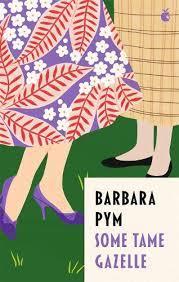
Now we’re talking. October ended on a high with Pym’s first novel. It features two sisters each in their fifties living together in their pleasant but ordinary village and harbouring quiet passions for the local vicar and a series of curates. Their quiet and orderly lives are disrupted by the arrival of visitors at the vicarage, some old acquaintances and some new. Could love disrupt their lives? The genius of Pym is that with any other novelist you’d be rooting for that outcome whereas here you find yourself rather hoping it doesn’t and things can go back to normal.
It’s hilarious, warm, wry, intelligent, utterly charming. In fact, I lack the words for it. No question but that it’ll be on my end of year list.
Lots of people have reviewed this, all glowingly. In no particular order there’s reviews by Jacqui here, Guy here, Karen here and Ali here. Honestly, if you’ve not read this you can find out what I read in November later. For now you should be getting this.
NOVEMBER
I’m assuming if you’re reading this you either already had Some Tame Gazelle or have rushed out to buy it. So, on to November!
The Terrorists, Sjöwall & Wahlöö (translated by Joan Tate)
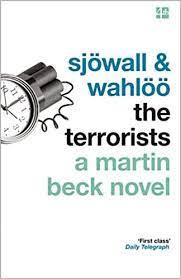
The tenth Martin Beck novel! Last of the series! Sadly, it was a bit disappointing. Beck and the crew are all as enjoyable as ever, but the crime here is an extremely convoluted series of political assassinations by a James Bond-style international criminal conspiracy and it felt like I’d jumped suddenly into a different genre. If you’ve read the rest you’ll want to read this and it has its strengths but for me it’s easily the weakest in the series. Oh well.
Dracula, Bram Stoker
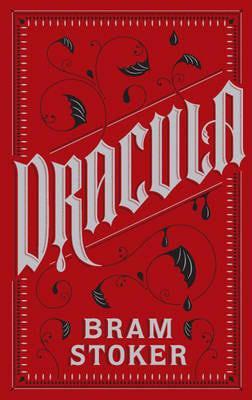
Possibly a bit of a cheat this, as actually I read the Dracula Daily Email. This is a project where each day you get emailed the bit of the novel which is written as taking place on that day. It changes the novel’s sequence slightly as it’s purely chronological which isn’t quite how Stoker does it. It is fun though and will run again next year.
The early sections with Jonathan Harker are the highlight (he’s a much more robust character than generally portrayed in adaptations). Dracula’s castle, the ‘brides’, Dracula’s sheer monstrousness, it’s all very well done.
Less well done is any scene with Professor Van Helsing, who comes over as a crackpot who this time happens to be right and who has some of the worst dialog I’ve read in really quite a long time.
Overall it’s Dracula. Iff you’re at all interested I’d encourage you to join up for next year. Details here.
A Wizard of Earthsea, Ursula le Guin
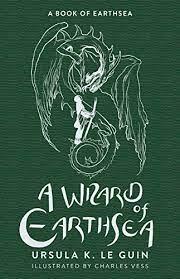
So I blame this one on Karen and her recent journeys in children’s and adult fantasy fiction. It inspired me to revisit one of my childhood favourites, A Wizard of Earthsea. Ged, a goatherd in an insignificant village on a minor island is born with a great power of wizardry and the book follows his journey to the famed college of magic and beyond in an attempt to undo the harm he let into the world with some of his early magical experiments.
It holds up pretty well as an adult read. There’s a nice mythic quality to it. It’s part of an original teratology and a couple of subsequent later sequels in addition and I’m not sure if I’ll go on to any of those, but this stood up well as a standalone.
So, thank you Karen for inspiring me to revisit this old classic. I hope to revisit Lord of the Rings next year, in that case absolutely and directly inspired by Karen’s rereading of it.
Casanova’s Return to Venice, Arthur Schnitzler (translated by Ilsa Barea)
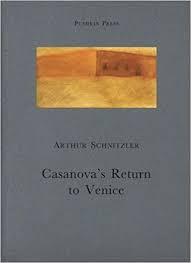
So I mentioned at the opening to this post a couple of stand-out reads this month. The Pym was one. This is the other.
I love Schnitzler’s work and I’ve read most of his that are in translation. For some reason I’d missed this one. A mistake, but a happy one as it meant I had a top-notch Schnitzler still on the shelf to be discovered.
Giacomo Casanova is in his fifties. He’s tired of his exile and wants to return to Venice. His powers are waning and increasingly young women he’d once have eyed as conquests now instead eye him as an irrelevant old man.
Casanova finds himself staying at the estate of a couple he helped many years ago with money for their marriage. The wife has designs on him but he’s more interested in the daughter. Trouble is, she seems more interested in a young army officer who reminds Casanova painfully of his younger self.
It is brilliant. Melancholy, well written, a beautiful meditation on aging but with a wickedly amoral underpinning and a slight swashbuckling edge (it is about Casanova after all). Lizzy Siddal gives an excellent account of it here. Lizzy is actually much less taken by it than I am but as a good reviewer still brings out its qualities.
Dark Eden, Chris Beckett
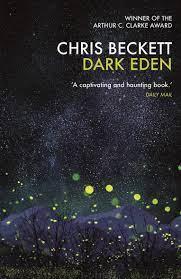
This is a novel which I think will be a future SF classic, the way people now refer back to classic SF of the 50s and 60s. A small colony exists on a planet with no sun, the only light coming from the plants and animals native to it. The colonists are primitive but with memories of a founding couple who unwillingly settled there. The society is riddled with genetic defects, the result of massive early inbreeding, and waits for when Earth will come back to rescue them all as their ancestors hoped they’d be rescued.
Change comes when a teenager questions the social settlement. He’s noticed that the hunting each year is a bit worse than before, but nobody’s willing to move in case Earth can’t find them when it comes. Generations have been born and died waiting for Earth to come. He decides to take action and the result is social schism, conflict and a fundamental undermining of their social contract.
Although the protagonists are largely teenagers this is not a YA novel, instead they’re used to create a generational clash between the old but failing order and a new order which isn’t sophisticated enough to take the good of what their elders built and jettison only the bad.There’s hard science clearly underpinning the whole thing, but since the characters don’t understand it most of it isn’t explained (though you can work it out as a reader if you want to).
Beckett creates a fully realised and very alien world then sets it into motion. It’s an absolute classic and deservedly received a lot of attention when it came out. There are several sequels – it eventually became a teratology and I plan to read them all.
Findings, Kathleen Jamie
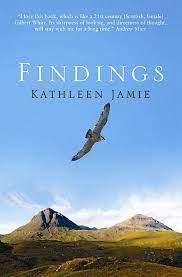
This is an essay collection by Orkney-based poet and naturalist Kathleen Jamie. It’s a book full of quiet moments beautifully observed. Jamie watches peregrines nesting from her kitchen window, explores the Edinburgh rooftops and skyline with the aid of a telescope, goes to watch salmon leaping in their attempt to return to their spawning ground. It’s a book rooted in the natural world and that includes at times some ugliness, but put in context and without losing sight of the magic of things which ultimately are quite ordinary (if far away from a city dweller like me).
Ali wrote this up really well here. Like Ali my favorite essay was the one on the Corn-Crakes, a bird I’d never heard of that was once so ubiquitous that every book set in the pre-industrial British countryside would have had its dialog accompanied by the bird’s distinctive crex-crex cry, rarely recorded precisely because it was so ubiquitous. Just a superb book and one that would make a wonderful Christmas present whether for someone close to you or just for yourself.
Minna Needs Rehearsal Space, Dorthe Nors (translated by Martin Aitken)
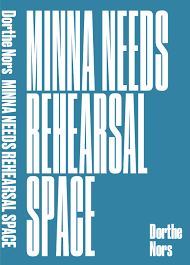
I’ve read two of Nors’ short story collections and didn’t really love either, so I didn’t have huge hopes for this. It turns out though that I’m much fonder of Nors’ long form fiction than her short (or maybe I just really like this one).
Minna is a composer. Minna has just had a breakup. Minna needs rehearsal space. Minna’s ex’s cousin has one. Minna’s ex won’t return her texts.
As you’ve probably guessed the book is written in a series of staccato sentences, though each standing on its own line so they run down the page like a poem rather than as a paragraph as I did it above. You’d think it would be gimmicky and annoying, but somehow it works well and it creates a kind of flatness which helps emphasize that everything Minna is going through is just life.
I was surprised by this one. Partly because I hadn’t liked the short stories as much as others seem to but also because it’s often very funny. There’s a great bit where Minna is on holiday and runs into a former music student who always wants to enthusiastically share their awful compositions with Minna. Minna can’t face spending her holiday with this person tagging along but is too polite to say so and instead tries not to be noticed. It’s very human as indeed is the whole book. I don’t think it’ll be on my end of year but it’s at least up for consideration which isn’t bad given how I didn’t take to Nors previously.
And that’s it!
